In the ever-evolving digital marketing landscape, where agility and adaptability are essential, businesses increasingly turn to funnel builder software as a pivotal strategy. These tools serve as instrumental assets, enabling organizations to maximize their online presence and efficiently convert potential leads into satisfied customers.
What is a Funnel Builder Software?
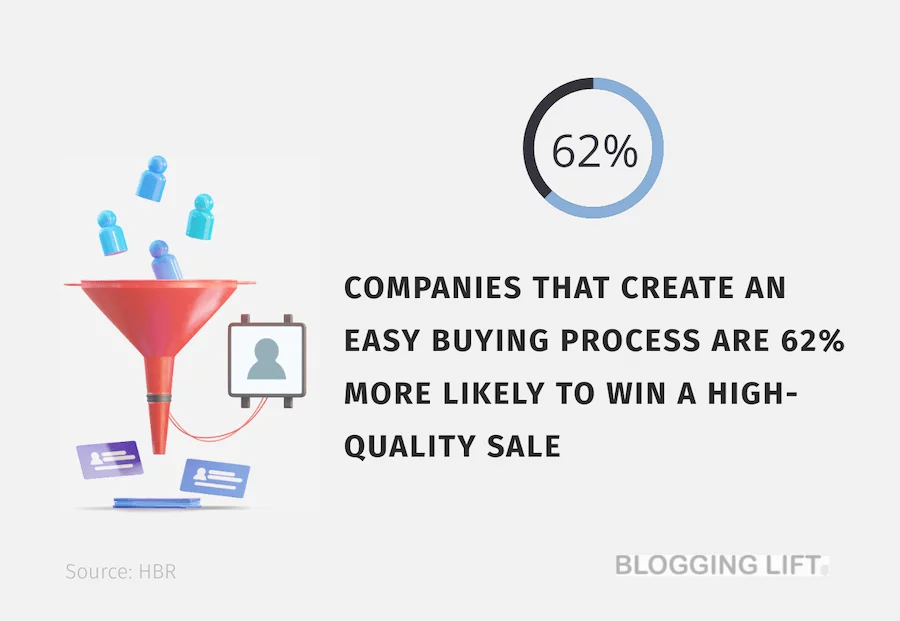
Funnel builder software is a specialized tool designed to efficiently create and manage online sales funnels. A sales funnel is a strategic system that captures leads, nurtures them through the customer journey, and encourages repeat purchases. These software tools often encompass marketing automation functionalities, empowering businesses to craft personalized and engaging email campaigns. These tools streamline the entire process of emailing customers.
Why You Need Funnel Builder Software:
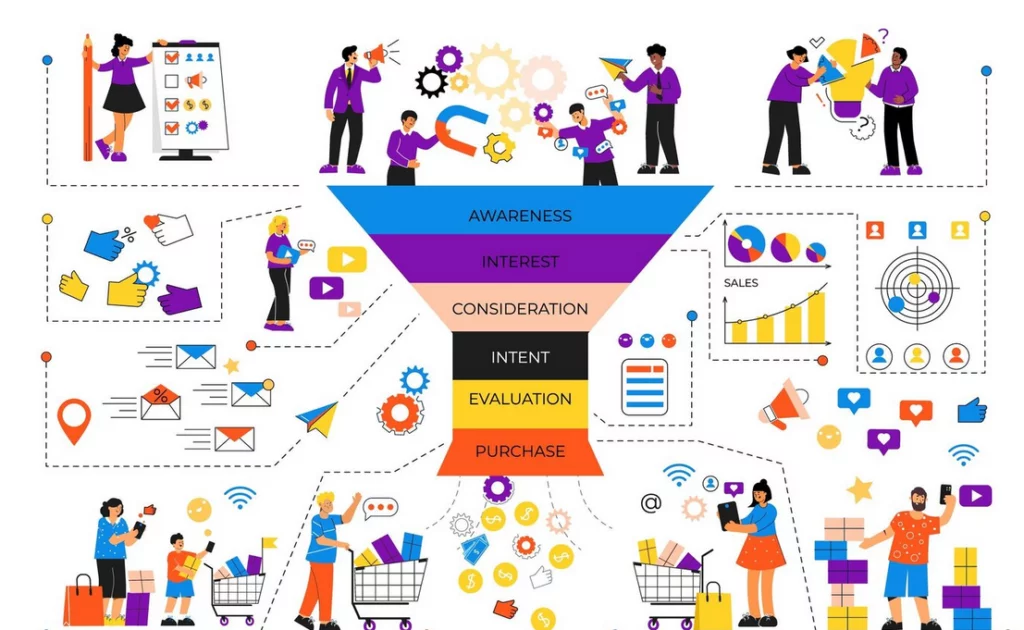
- Optimized Sales Process: It is crucial for enhancing any business’s overall sales process. The software aligns sales and marketing efforts, ensuring they work cohesively to generate maximum revenue.
- Efficient Lead Management: Funnel builder software facilitates funnel creation based on user interactions, such as clicking a link or submitting a form. This aids in effective lead management.
- Performance Tracking: The software allows businesses to track leads’ progress through each step of the funnel. This tracking capability enables data-driven decision-making and continuous improvement.
Key Features of Funnel Builder Software:
- Drag-and-Drop Interface: Most funnel builders offer a drag-and-drop interface, making it suitable for users to add, rearrange, and customize elements within their funnels without writing any code.
- Template Library: A library of pre-designed templates helps users get started quickly. These templates often cover various funnels, such as lead generation, sales, webinars, etc.
- Integration with Marketing Tools: Funnel builders often integrate with famous marketing tools, like email marketing platforms, customer relationship management systems, and payment gateways, to create a seamless and connected marketing ecosystem.
- A/B Testing: Many funnel builders provide A/B testing capabilities, facilitating experimentation with different elements within their funnels to optimize conversion rates.
- Analytics and Reporting: Comprehensive analytics and reporting features help users track the performance of their funnels, providing insights into visitor behavior, conversion rates, and other key metrics.
- Responsive Design: With an increasing usage of mobile devices, funnel builder software typically ensures that the created funnels are optimized for various screen sizes and devices.
- Sales Automation: Some advanced funnel builders incorporate sales automation features, enabling users to automate follow-up emails, segment leads, and nurture prospects through the funnel.
Learn about the entire process here.
Top Funnel Builder Softwares of 2024:
1. GetResponse
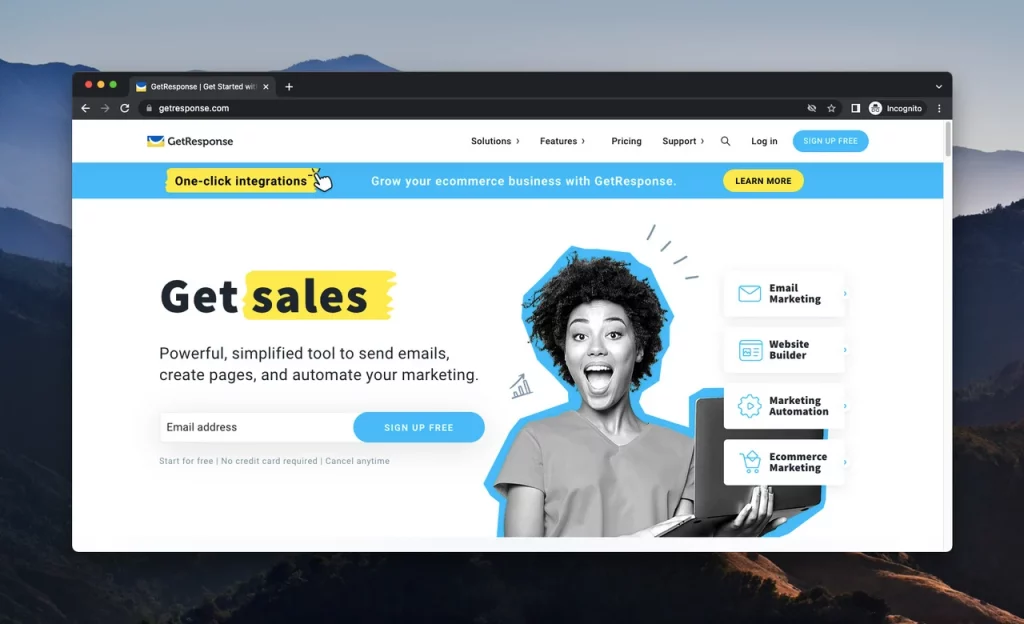
As an email marketing tool, GetResponse stands out with its integrated sales funnel builder feature. Tailored for e-commerce, this tool aids online retailers in creating landing pages, automating email campaigns, recovering abandoned orders, and converting customers.
Pros:
- Basic reporting and web analytics features enhance marketing analysis.
- Lead management features include a marketing lead database, data quality management, lead nurturing, and scoring.
- Intuitive drag-and-drop feature for building dynamic content, landing pages, and forms.
- User-friendly interface and adaptable dashboard.
Cons:
- Limited funnel-building capabilities that need improvement.
- Limited font options with the inability to add custom fonts.
- The customer segmentation process may pose challenges for beginners.
- Customer support requires enhancement.
Pricing:
- Free forever plan with limited access.
- Paid plans start from $15.58 per month.
- Pricing may vary based on the number of contacts.
G2 Rating: 4.2/5
2. Systeme.io
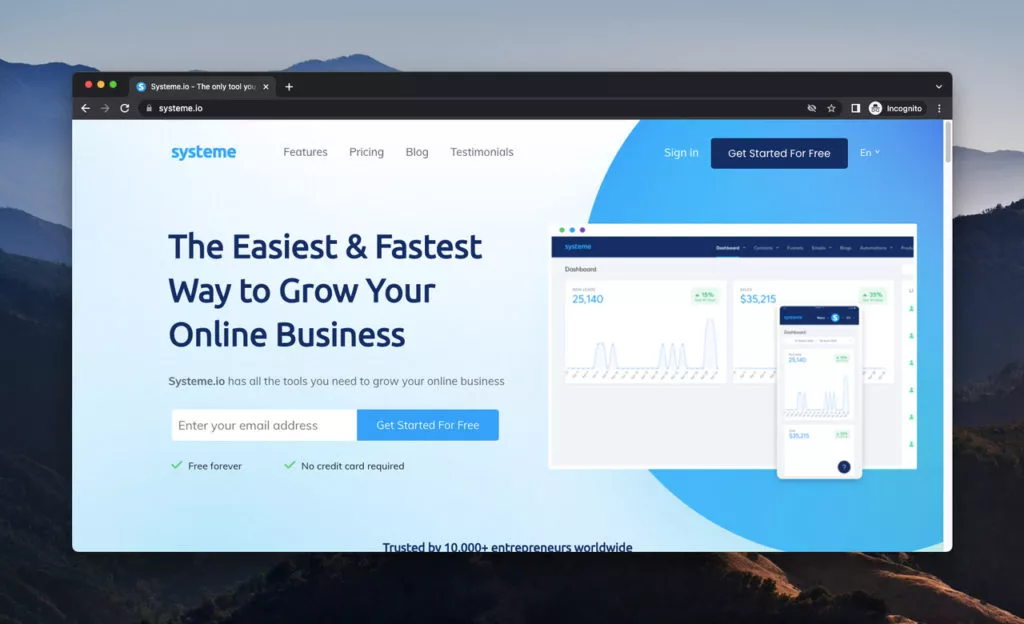
Systeme.io is an all-in-one marketing tool catering to various online businesses. It empowers users to grow and scale their businesses through features like sales funnel creation, automated email campaigns, website setup, and campaign automation.
Pros:
- Creation of sales funnels based on proven templates for enhanced conversion.
- Capability to create and send unlimited email campaigns to prospects.
- Affiliate program management with automated payouts.
- Evergreen webinars feature for reaching a target audience.
Cons:
- The basic design of standard embed forms requires optimization.
- Limited advanced options for page building and email marketing.
- The onboarding process needs improvement for user adaptation.
Pricing:
- Free forever plan with limited contacts.
- The startup plan starts from $27 per month.
- The webinar plan starts from $47 per month.
G2 Rating: 4.4/5
3. Kartra
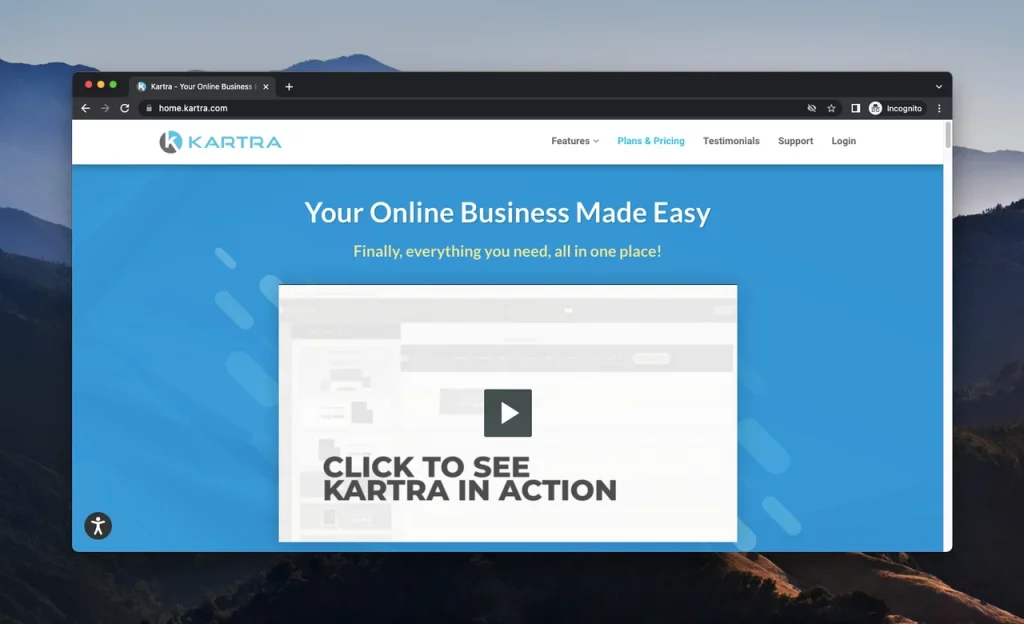
Kartra, an all-in-one business platform, caters mainly to online business owners. It functions as a marketing funnel builder software, enabling users to create automation based on customer actions. It has lead management features like a marketing lead database, segmentation, data quality management, and automated alerts.
Pros:
- Robust email marketing features, including email building, personalization, outbound emails, and automated responses.
- Interconnected pages with a multi-page funnel flow for streamlined processes.
- Lead tagging feature for effective prospect segmentation.
- Pre-made marketing options to enhance sales conversions.
Cons:
- The user interface and user experience need improvement.
- Checkout pages require optimization.
- The initial cost may be relatively high for trial users.
Pricing:
- The starter plan starts from $99 per month (up to 2,500 leads).
- Silver program starts from $199 per month (up to 12,500 leads).
G2 Rating: 3.9/5
4. ActiveCampaign
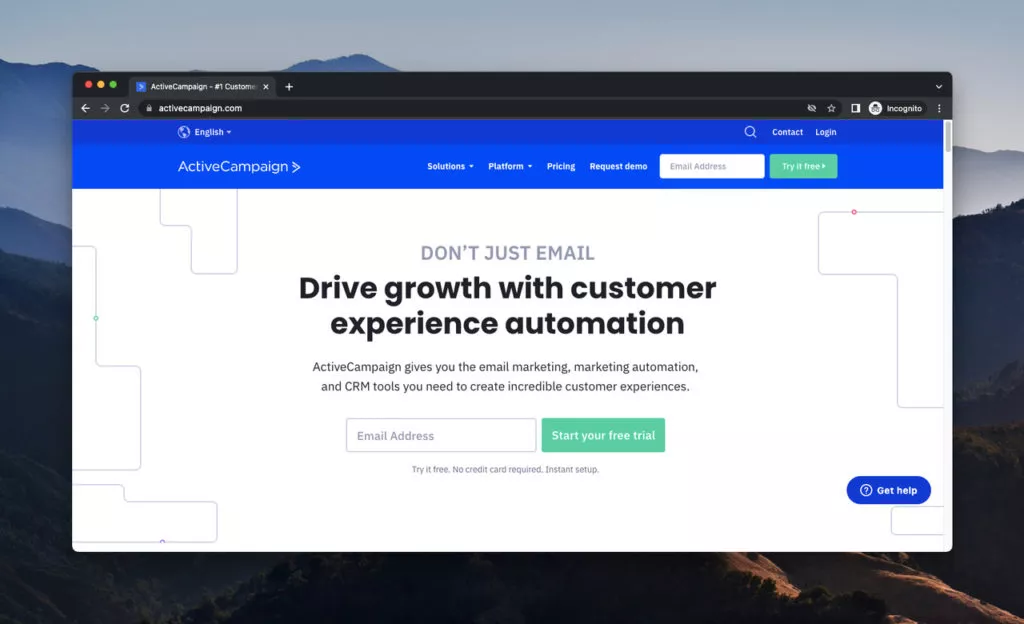
ActiveCampaign equips users with tools for the sales funnel and offers robust campaign-building options. With web analytics and essential reporting solutions, users can analyze the outcomes of their actions. The platform also provides practical and user-friendly email marketing solutions.
Pros:
- Sales engagement automation utilizing customer data from sales and marketing efforts.
- Lead scoring for dynamic messages, sales alerts, online behavior tracking, and lead nurturing.
- User-friendly interface with comprehensive help documentation.
- Tracking interactions with clients and potential leads for enhanced conversion.
Cons:
- Customizing automation and forms can be challenging for beginners.
- Improvement is needed for email templates and builders.
- The plan is expensive for some users, and the lite plan has limited access.
Pricing:
- The lite plan starts from $9 monthly with limited access.
- Plus, the plan starts from $49 per month.
- Pricing details vary based on business types such as B2C, B2B, and ecommerce.
G2 Rating: 4.6/5
5. ClickFunnels
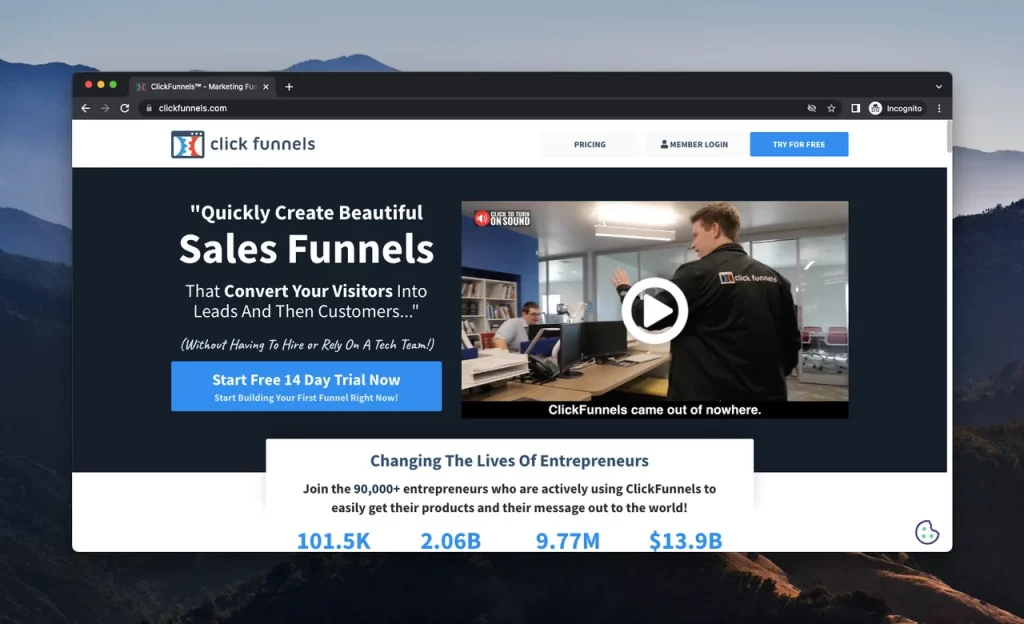
ClickFunnels is a popular funnel builder software offering ready-to-use templates and customization options. With an easy-to-use platform and insightful tutorials, it caters to users with varying experience levels. Integration with Popupsmart adds to its appeal for increasing conversion rates.
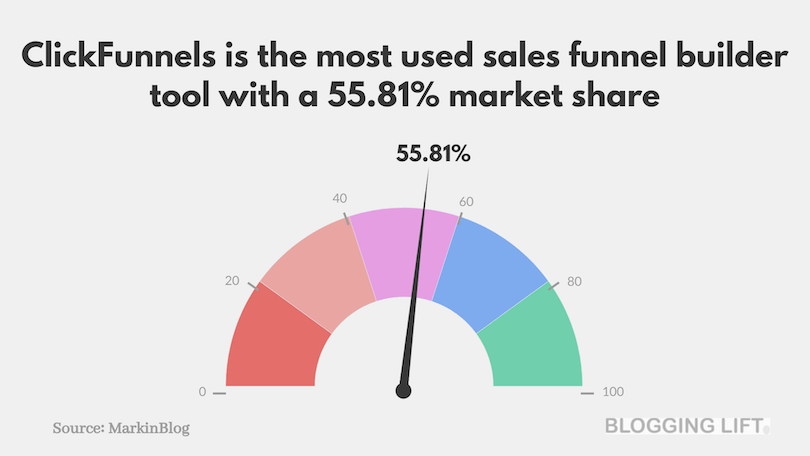
Pros:
- User-friendly website and funnel builder suitable for non-coders.
- Growth features include marketing tools, site analytics, SEO, and hosting features.
- Sales automation features to aid in building effective sales funnels.
- Pre-made customizable designs simplify funnel creation.
Cons:
- Pricing might be high for small businesses, and the 14-day trial might be limiting.
- Design elements need improvement to address occasional errors.
- Customer support response time requires enhancement.
Pricing:
- Offers a 14-day free trial with contact sales team for pricing details.
G2 Rating: 4.7/5
6. HubSpot
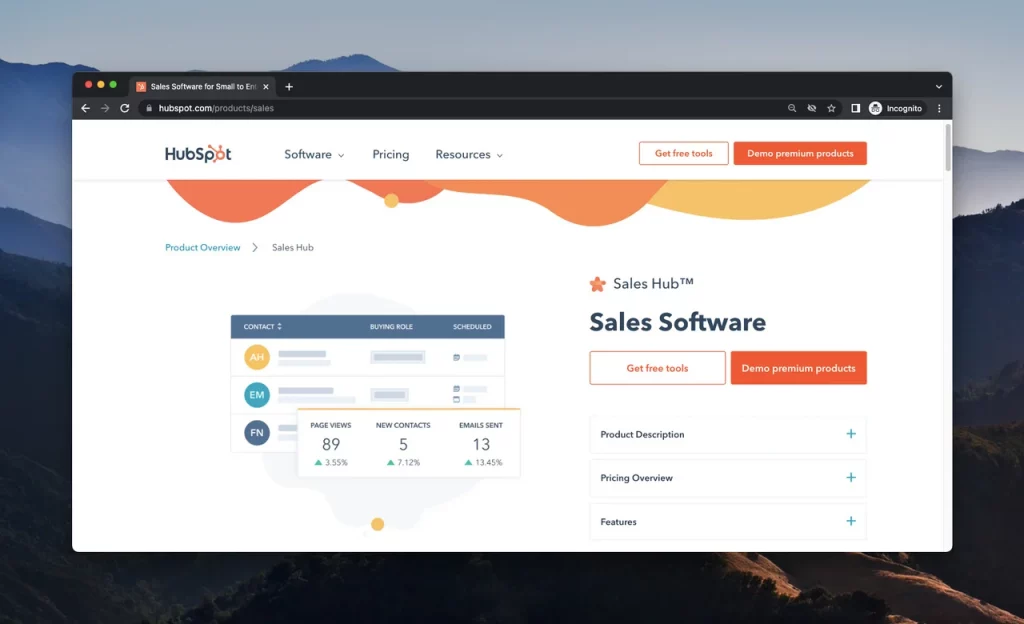
HubSpot’s Sales Hub solution serves as a versatile funnel builder, functioning as a sales CRM with robust sales engagement tools and analytics. It aids businesses in monitoring conversion rates and improving sales funnel outcomes through comprehensive funnel reports.
Pros:
- Sales force automation features include contact, account, and task and activity management.
- Marketing automation solutions cover email marketing, campaign management, marketing ROI analytics, and lead management.
- Reporting and analytics features with dashboards and forecasting for effective data monitoring.
- Easy-to-use funnel builder with an intuitive user interface.
Cons:
- Importing contacts may lead to errors like repetition with existing contacts.
- Time data point omission, relying solely on dates, maybe a drawback for some users.
- The professional plan might be costly for small businesses.
Pricing:
- A free-to-use plan is available.
- The starter plan costs $45 per month, and the professional program costs $450 monthly.
G2 Rating: 4.4/5
7. Thrive Themes
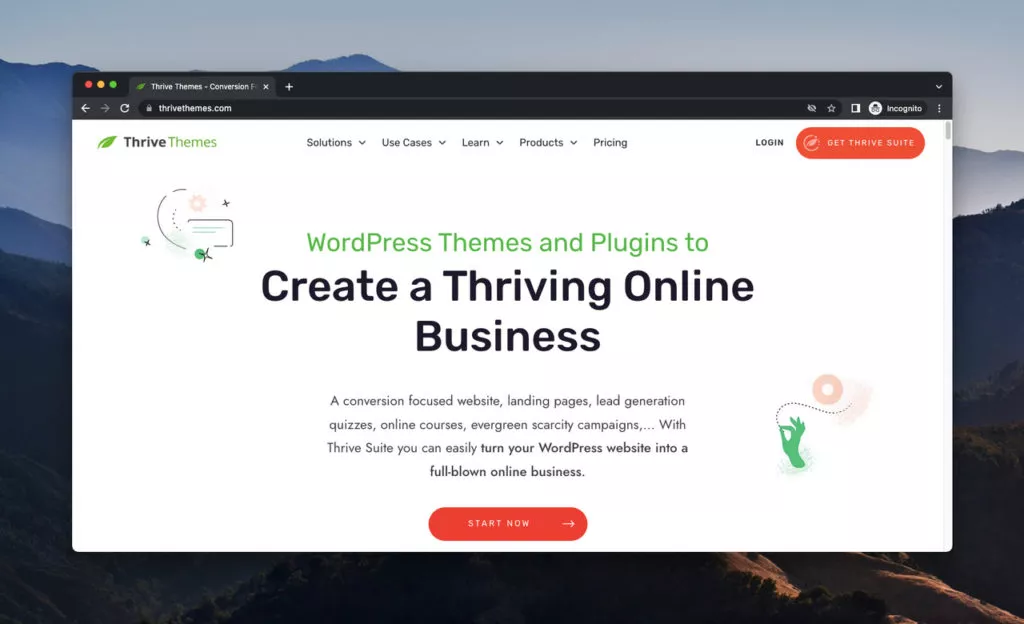
Thrive Themes specializes in WordPress templates and plugins, catering to beginners without coding experience. It provides solutions for building sales funnels, offering customization options, ready-to-use templates, and optimization for mobile devices.
Pros:
- Customization options include one-click color customization and block-based page creation.
- Quickly creating funnels with landing page sets for upsell, confirmation, thank you, and download pages.
- Mobile-optimized templates for enhanced conversion.
- Beneficial and informative help desk.
Cons:
- Non-compliance with GDPR and challenges in customization.
- Potential integration issues with other platforms.
- Pricing might be higher for beginners and small businesses.
- Limited templates for websites.
Pricing:
- The Thrive Suite quarterly plan starts from $99, and the yearly plan starts from $299.
8. Keap
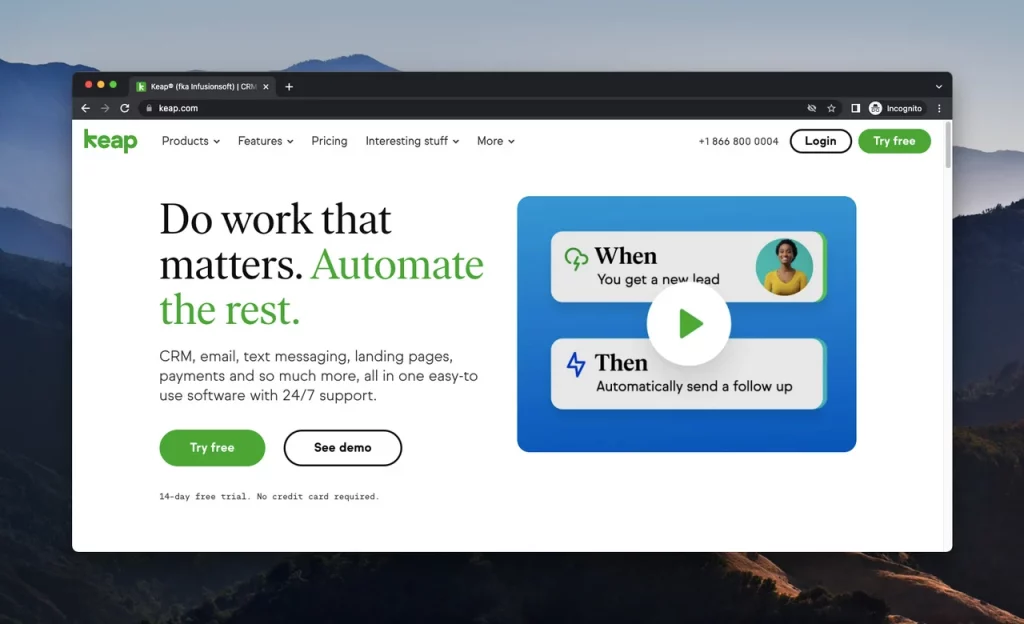
Keap is a top-notch funnel builder software, an all-in-one CRM and marketing automation platform, empowering businesses to achieve growth effectively.
Pros:
- Basic reporting and analytics features aid in business analysis and improvement.
- Email marketing solutions encompass building and personalizing emails, outbound emails, and automated responses.
- User-friendly drag-and-drop sales pipeline enhances sales closure and conversions.
- Customizable dashboard for efficient lead management and customer segmentation.
Cons:
- Initial complexity in creating campaigns and setting up the tool.
- The interface might be overwhelming for beginners.
- Email templates could benefit from increased flexibility.
Pricing:
- The pro plan costs $129 monthly with 1500 contacts and two users.
- Max plan starts from $199 per month, including 2500 contacts and three users.
G2 Rating: 4.2/5
9. Leadpages
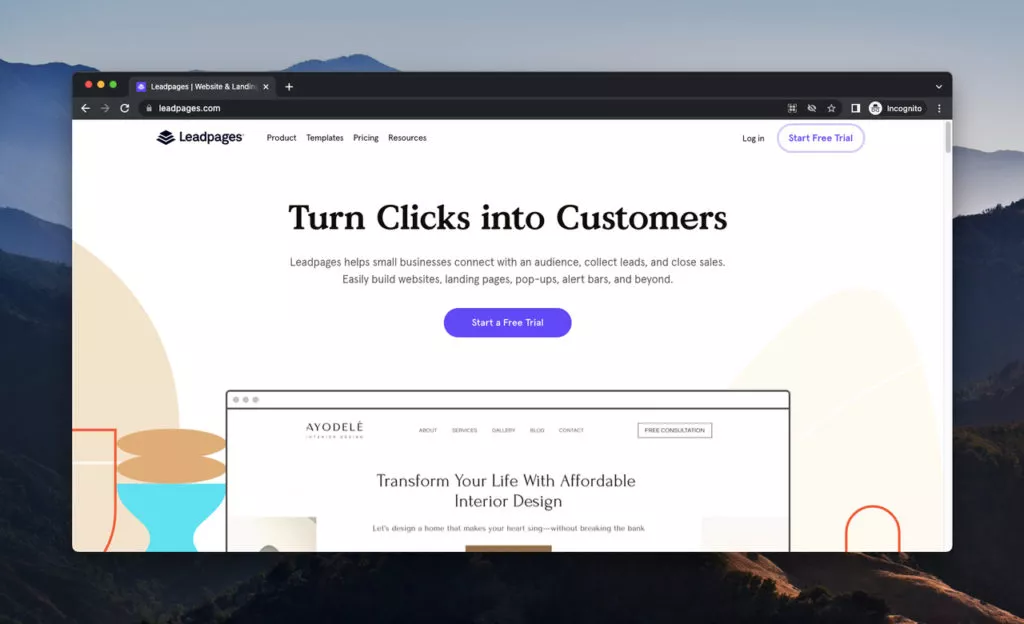
Leadpages excels in providing lead generation solutions for building business funnels, making website publishing and landing page creation practical with its versatile features.
Pros:
- The drag-and-drop interface is highly customizable and user-friendly.
- Automatic saving and duplicate & edit features for efficient landing page creation.
- Valuable features like lead backup, notifications, and routing enhance lead collection.
- Mobile-responsive and SEO-friendly pages contribute to a positive user experience.
Cons:
- The desire for search bar widgets and specialized page options.
- Limited seamless integration with some platforms.
- Ready-to-use templates could be improved.
Pricing:
- The standard plan is $37 per month, applicable for single site.
- The pro plan starts from $74 every month and is usable on three different sites.
G2 Rating: 4.1/5
10. Landingi
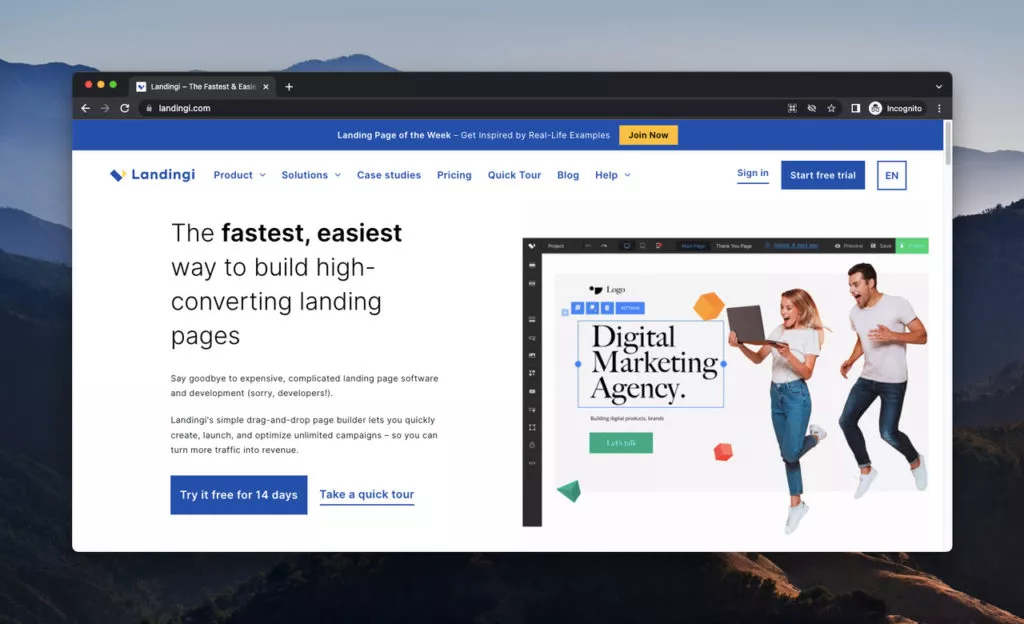
Landingi is an easy-to-use funnel builder tool suitable for any business type. Its sales funnel solutions facilitate sales boosts, sales process automation, and error identification.
Pros:
- Over 300 landing page templates are categorized by different industries.
- Integration with platforms such as HubSpot, Salesforce, Sendinblue, and Mailchimp.
- The intuitive user interface, beginner-friendly with drag and drop feature.
- Quick creation of landing pages to streamline marketing efforts.
Cons:
- The desire for more flexible organization of landing pages.
- File management might be overwhelming for some users.
- Improvement is needed in customer support response time.
Pricing:
- The plan costs $65 monthly and suits business owners and small businesses.
- The automated plan costs $89 per month, catering to marketing professionals.
G2 Rating: 4.4/5
11. Instapage
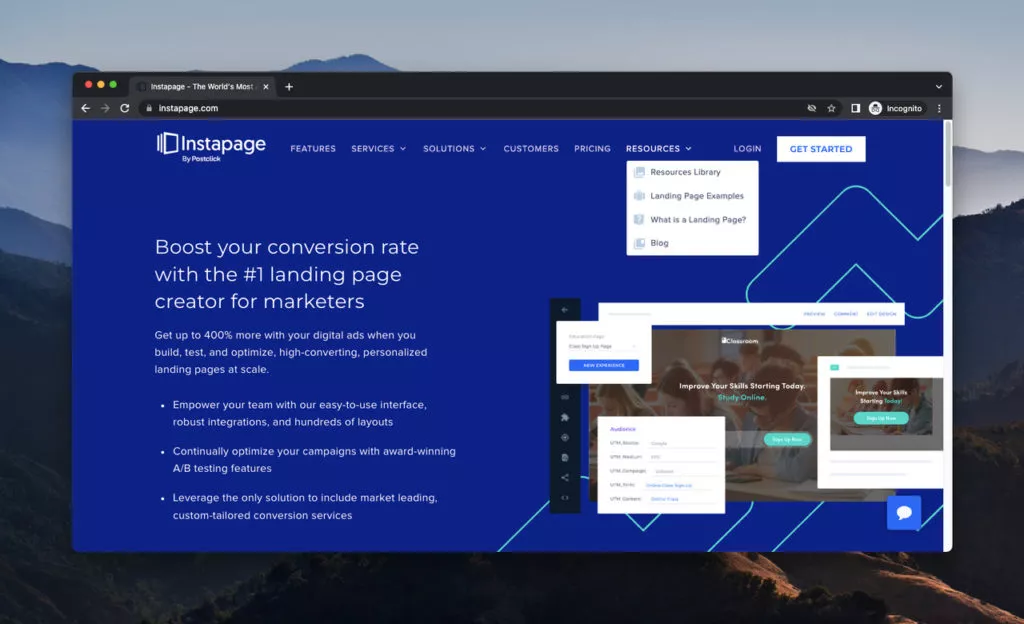
Instapage is a landing page and funnel builder that focuses on increasing sales conversions. It offers a variety of template layouts catering to different industries and use cases.
Pros:
- Visual on-page collaboration for real-time team and client collaboration.
- Widgets facilitate the quick addition of layers to pages.
- Form builder tool for streamlined audience outreach.
- GDPR compliant with fast page loading for enhanced user experience.
Cons:
- Insights into page performance need more accuracy and detail.
- Mobile version editing and the addition of certain elements can be tricky.
- It’s a relatively expensive tool for those wanting to try it first.
Pricing:
- Building plan starts from $199 per month; custom plan pricing is available upon reaching out to the sales team.
G2 Rating: 4.3/5
Conclusion:
If you want to elevate your sales conversions, these options offer diverse benefits and strengths, each providing unique solutions.
Consider not only their funnel-building capabilities but also explore their additional product offerings, user intuitiveness, and affordability tailored to your business needs. Feel free to share your favorite tool in the comments section below, and don’t hesitate to provide recommendations.
FAQs on Funnel Builder Softwares:
Which funnel builder is best?
ClickFunnels, Leadpages, and EngageBay, stand out as top-notch sales funnel builder software options to foster business growth. With numerous tools available, the ideal choice depends on your site type, visitor volume, and budget constraints. Our article presents a curated list of funnel builders, allowing you to make informed decisions by assessing their pros, cons, and offerings.
What are the four stages of the sales funnel?
The sales funnel comprises four key stages:
- Awareness: Capture attention and create brand awareness through advertising or compelling social media content.
- Interest: After gaining attention, focus on building relationships by providing valuable information. To retain interest, sustain engagement on social media.
- Desire: As visitors express interest, offer detailed information about your products or services to cultivate desire.
- Action: The final stage involves conversion, where individuals purchase or avail services through your website or store.



